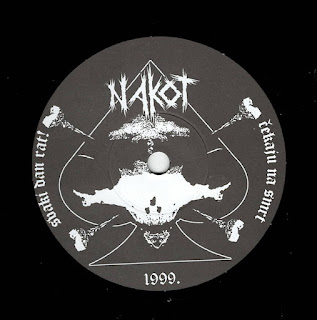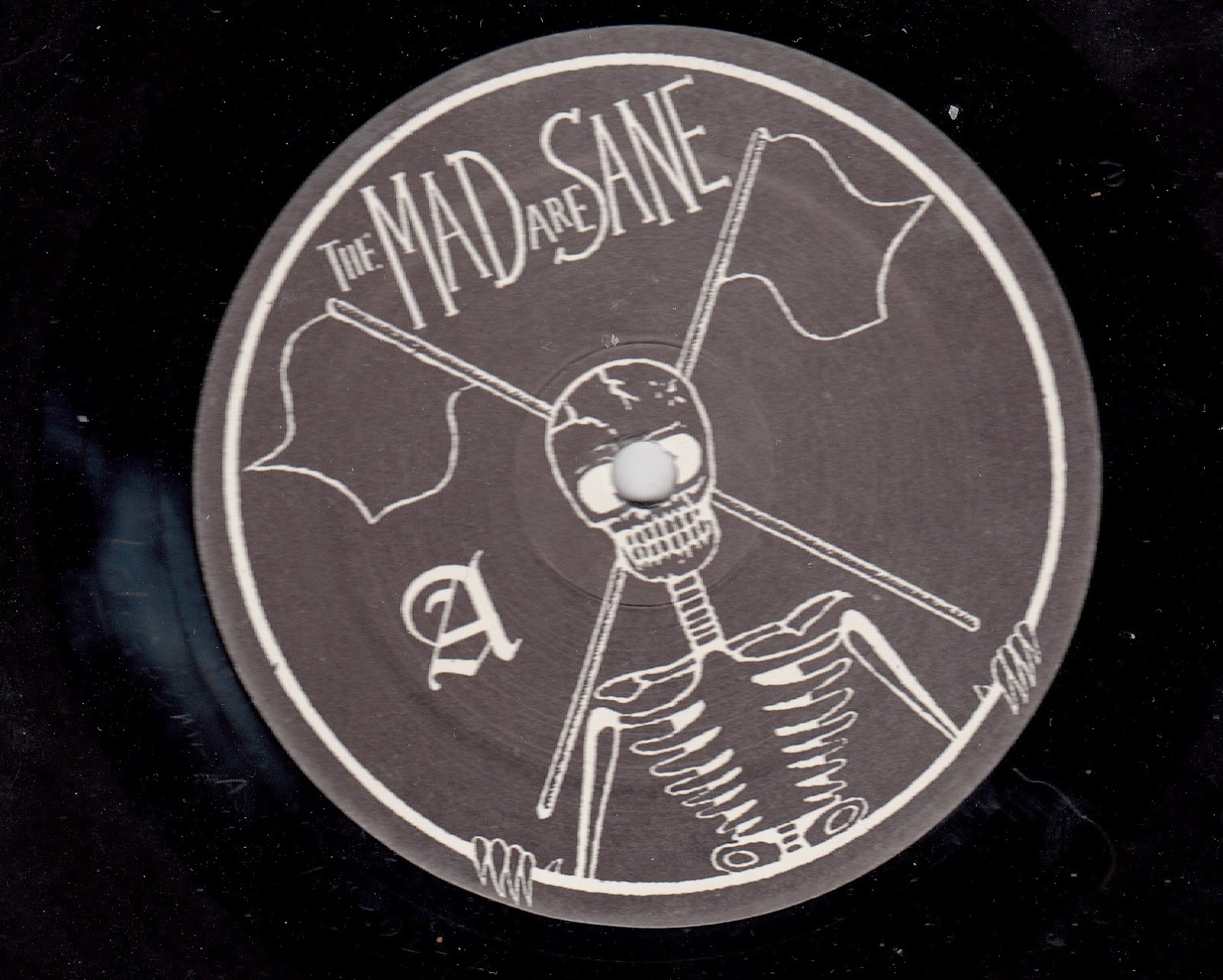This is a record I actually bought fairly recently, out of nowhere really, at a local punk gig that had rather melodic bands on the bill. I always check out record stands in case something decent got lost in the midst of all the usual crap (or fast food punk as I wittily call it) and, as the night proved it, you never know what you are going to come across. To find this Ep, 17 years after its release, was unlikely and I imagine it had been sleeping in the box since it came out after a record trade. It might seem curious but then some distros have been sleeping for ages and only see the light day every three years or so and beside the genre that Dyspnea and Nakot engaged in not being really popular in France it is not all that surprising. It has to be said that some of this split's jail mates - some of which had been doing time in the box for well over twenty years - were bound however to remain buried there for eternity. Still you've got to love sleeping distros, they're always a fun, albeit frightening at times, trip into the past that will have you reminisce about bands that should not be reminisced about sometimes. Who needs to remember third rate Ekkaia wannabes?
I vaguely remembered Dyspnea as being "kinda neocrusty" but my memory of Nakot was much more accurate, or rather I remembered accurately quite liking Nakot even though I had not played their split with the brilliant Дажд/Dažd (a cruelly underrated band whose first album I rate very highly) for a while. So when I bumped into this great-looking humble record for a mere three euros, I didn't mess about and grabbed it. I saw surprise but also gratefulness in the eyes of the bloke running this tiny distro. Mind you, this Ep may have traveled more than me. The context of the release of this Ep was quite specific as it showcased two contemporary, modern, young bands from the Balkans which was not so common at the time, especially from my perspective as I still did not know much about the Greek scene (about which I have written extensively) and even less about bands from Yugoslavia. As I recall it, this collaboration between Dyspnea and Nakot excited my curiosity because I had not quite figured out yet that the classic 00's crust/d-beat/scandi sound had reached the Balkans. No, as you can see, I haven't always been the quickest kid on the block.
It strikes me as a little strange that Dyspnea, from Tyrnavos, almost always slips my mind when I reflect upon the Greek crust mythology, an activity I engage in often, deeply and with statuesque intensity. Still, I know I must have come across the name right when the band started through the then active blog scene of the late 00's, quite possibly thanks to Crustcracker or Crust Demos (the latter surviving until 2020), two blogs that were run by punks from Greece that I checked regularly and focused on obscure contemporary international bands of the fast and punishing variety. Those, among others, were great sources of information and inspiration as it reinforced the idea that punk was an unstoppable DIY international movement and that youthful talentless people from all over the world, be they from Chile, Indonesia or Slovenia, could also try to sound like Discharge or Doom and that's the real beauty of punk-rock, what unites us all.
But to get back at Dyspnea they always stood for that time and the discovery process attached to it in my mind, they epitomised the type of bands that I would get to know through a blog: pretty local, pretty raw and pretty typical of the era (three criteria that are in no way bad things). I used to download a lot of music from these blogs (and I still do download a lot of music) and I loved the fact that they often promoted bands that were local to them. This recording is pretty raw, if not rough, even by 00's standards and if I did not know better (or if I could not read) I would have thought that they had been around in the early 90's rather than the late 00's. In any case Dyspnea cannot be described as being "neocrust", although they do have the odd melodic leads, an intensely dark vibe and a logo that is not dissimilar to Tragedy's (but you get five eagles instead of just one, it's a bargain). The vibe is dark, very dark, anguished even and the low gruff vocals sound pretty desperate indeed. Of course the Greek language works brilliantly with this kind of atmosphere (only the first song "Βολικοί Στη Σιωπή" is sung in Greek though, the other one is in English). The first number unleashes raw, bleak, fast crustcore with a slow-paced metallic break toward the end while the second is a groovy mid-paced one with a filthy tone and a singer sounding like he uses uranium as mouth wash. Beside ace Greek old-school metal crust bands like Ανθρώπινος-Λήθαργος or Βιομηχανική Αυτοκτονία, it reminds me of Czech gruff crust bands like Mass Genocide Process and neo(ish)crust geniuses Leadershit. Dyspnea would appear years later in 2014 on a split Lp with fellow countrymen Unfit Earth, using the same recipe but with a much cleaner and heavier production. It was well executed but did not have the charm of those two songs.
On the other side are Nakot from Belgrade, a relatively short-lived band formed in 2005 that is still remembered - as far as I can tell - more for their relevance probably than their music because they stood for a new generation of punks ready to spit in the face of the powers that be in the difficult context of post-war Serbia. I was not aware of many Yugoslavian punk bands at that point in time - I was absolutely clueless about the buoyant scene of the 80's with the Ljubljana hardcore scene and the tons of national postpunk bands - and in fact, apart from Nulla Osta from Pula that played in 2006 in a squat in Paris (a band made even more exotic because they played with two bass guitars, crazy bastards), I would have struggled to name a Yugoslavian punk band. A friend of mine assured me that she had heard Serbian punk tapes so I at least knew the theoretical existence of punk music in that part of the world. But I'm sure a grindcore fan my age would have had a different perspective and vaster knowledge of the scene there because of the sheer number of grind/fastcore bands there. You could say Nakot, along with the aforementioned Dažd and Anaeroba from Slovenia - because their records could be found relatively easily on Western distro tables - opened a few doors on that level and expanded my punk multiverse.
Nakot were also appealing because, to put it quite simply, they played a style I already liked and wore patches similar to mine (I assumed). They were basically a gruff scandicore band, a familiar genre that was accessible, and used typical - albeit drawn brilliantly - visuals with skulls, desolation, suffering and the good old Crass font. It felt like going to see a Serbian relative on vacation. Even if you had never met him, it was still family. Nakot's music on this split Ep was fairly simple, heavy and direct käng hardcore, a little lacking in terms of power because of the production (their next record largely solved this), but still delivering the goods. Picture Hellkrusher and Dread 101 partying hard while listening to Driller Killer. You can tell the band is genuine and they mention that when they sing about war, it comes from experience and is not "punk fetishism".
Shortly after the release of this split, the remarkable efforts of some dedicated bloggers allowed me to explore the prolific 90's Yugoslavian DIY hardcore punk scene and discover dozens of tapes (they almost always were tapes) from the likes of Krvavi Mandat, S.m.c, Verbalni Delikt, Fight Back, Bad Justice, Intoxicate, Hoću Neću! or Totalni Promasaj. The continuity between those bands and Nakot ten years after made sense but also highlighted how much of a 00's band - sonically and visually - the latter were. It has to be said that the gloomy screen-printed artwork, expertly done by Doomsday Graphics, is one of the record's strongest points in spite of the rather common themes it depicts (but then that's what we are all looking for, right?).
A modest yet interesting record to be sure released on three Greek labels, Alcoholic Desaster, We don't Fight it! and Scarecrow, now a well-established label and record store, of whom it was the very first release.





















































